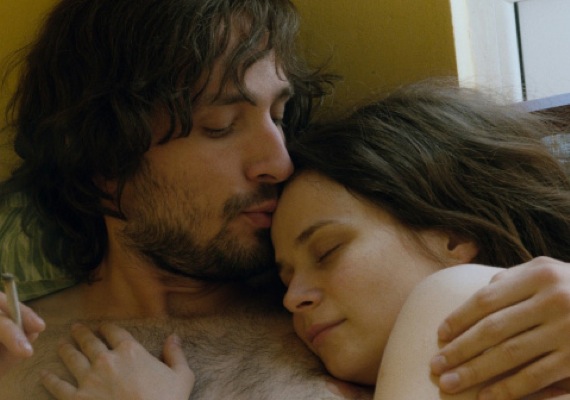Ana, mon amour: You do me good, you kill me…
- BERLIN 2017: Calin Peter Netzer brings us an intense exploration of the Freudian id of a love affair that plays out alongside mental illness, in which you never really know who’s torturing who

Right from the opening scene of Ana, mon amour [+see also:
trailer
interview: Călin Peter Netzer
film profile] we recognise the extremely well-polished style and virtuosity of the winner of the Golden Bear in 2013 with Child’s Pose [+see also:
film review
trailer
interview: Calin Peter Netzer
film profile]. Romanian director Calin Peter Netzer, who’s back in competition at the Berlinale, brings us an extraordinarily complex piece, once again built on overwhelmingly intense dialogues. The screenplay for his latest film is actually even denser than that of his previous film, as the issues are a lot less clear here. And for good reason, as the film unfolds on unstable terrain, roamed by the shadows of psychological suffering, in the context of a love affair in which enduring depression (that of Ana, played by Diana Cavallioti), and the ensuing ordeal of Toma (Mircea Postelnicu), both impedes and drives the relationship, as we gradually realise over the course of a series of flashbacks and flashforwards that give us a fragmented overview of their story (as well as a few previous family traumas, the root of the problems being analysed), all during a psychoanalysis session which spans the entire film and skilfully makes everything we are shown wide open to interpretation.
Ana, mon amour is thus dense and convoluted in its very essence, to the extent that it’s a question of letting the Freudian id speak, the source of the pain (the need for words, through automatic writing, an intimate admission or confession, is the persistent basis of the entire first act), in such a way that manages the chaos of the very subtle and relentlessly undefined social dynamics exposed here – (inter)dependence, devotion/selfishness, guilt, lies/deception, etc. – to draw some sense out of it all, without, however, losing sight of the fact that any attempt at theorising will only ever be one possible interpretation of the facts, a "subjective" account, as the outstanding epilogue reminds us.
Netzer deliberately leaves us facing this flurry, quashing right from the off any temptation to contain the story that follows to a moral approach (when that was the strong point of Child’s Pose). In the end, of course, it’s up for discussion, like everything for that matter, as there’s no objective truth in the feelings and relationships (not even in the proverbs), even though the characters insist throughout the film on the notion of "knowing", or "not knowing". Even in relation to this necessary complexity adopted by the film, some scenes and themes (most notably religion) could perhaps have been avoided or cut back on, but the cleverness of the writer (right up to his radical way of shamelessly dropping us into the intimacy of the relationship between Ana and Toma, in their bed and in the shower – a lack of privacy that he also subjects Toma to when he puts him in bed with his fat father-in-law one hot summer’s night) is a delight. Just like nothing here is left to chance, with everything devilishly meticulous and purposeful (contrary to what we might think), every moment of the film brings us some gem, a connection, a stroke of genius, beyond those that are verbalised by the characters. For example, the way the person confessing sits on the knee of the priest, or the clearly very sexual panting of Ana after her near suicide attempt, or the look of renewed love that the director makes us see her with just a few minutes later, even though she drives us mad, through the prism and gaze of Toma. Because after all, Ana isn’t the focal point of Ana, mon amour.
Produced by Parada Film (Romania), Sophie Dulac Productions (France) and augenschein Filmproduktion (Germany), the film is being sold internationally by German company Beta Cinema.
(Translated from French)
Did you enjoy reading this article? Please subscribe to our newsletter to receive more stories like this directly in your inbox.


























